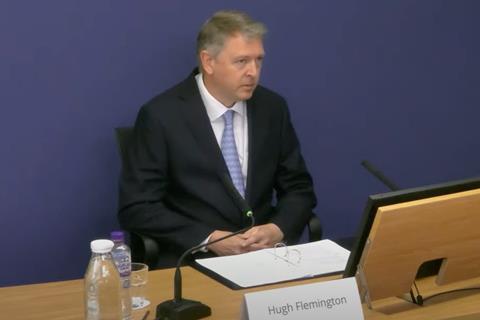Follow our live blog from the public inquiry into the Post Office Horizon scandal
4.20pm: The inquiry hears that prosecutions effectively ended when Cartwright King and its lawyers said Jenkins' evidence was not reliable. Bowyer tells the inquiry: 'It may well be that Cartwright King are not covered as far as their role as independent lawyers is concerned but it did stop the prosecutions at that stage and begin the disclosure sift.'
Sir Wyn Williams interrupts and suggests we wrap up for the day, even though counsel is not done with Bowyer, so he will be back tomorrow - as will we.
4pm: Despite doubts about the reliability of Gareth Jenkins' evidence, he continued to be instructed as an expert witness in Horizon cases. Bowyer says this was a mistake in hindsight.
The barrister is taken to a draft statement prepared by Jenkins where he lists by name the cases he has advised on. Bowyer suggested taking much of that information out because it was lead to 'vast quantities of paperwork' from defence disclosure requests. Asked if he should have suggested such changes to a witness statement, Bowyer says it would be 'absurd' if someone could not put such papers in front of a lawyer.
3.45pm: Bowyer says he was unsure about expert witness Gareth Jenkins and the inquiry hears that he advised in 2012 preparing a 'generic statement' for use in prosecutions. He denies this was a sign that lawyers were protecting the system rather than trying to ensure the court was given all the proper evidence. ‘I was not suggesting having us serve blanket evidence in each case,' he tells the inquiry.
3.15pm: More analysis of Bowyer's Wylie advice. He said he assumed the system was 'still foolproof in which case we should defend it aggressively'. Price asks if this assumption and such an unequivocal position was safe. Bowyer says that with hindsight it was not, although he continues to assert it was the correct position based on his knowledge at the time. Bowyer had also warned of an 'astronomical' risk of bringing in doubt about Horizon.
He says that if the system turned out to be compromised it would be disastrous, which is how it proved to be.
We go to a quick break.
3pm: Bowyer is taken to the section in his Wylie advice (pictured below) where he is critical of the Post Office announcement that Second Sight was reviewing a small number of prosecutions. He did not know why Second Sight had been instructed and said the argument from sub-postmasters would be there is no smoke without fire. His advice went on to say this would go viral among defendants.
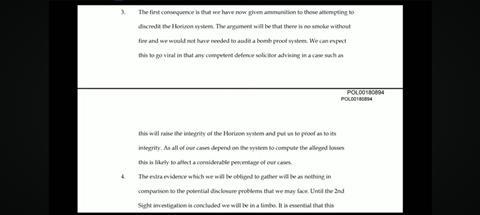
2.40pm: Bowyer advised the Post Office on prosecution strategy for the Kim Wylie case in 2012, saying her defence would focus on the reliability of Horizon. He said 'we will need to prove the integrity of the Horizon system as there appears to be apocryphal evidence on the internet that is causing big losses'.
Inquiry counsel Emma Price asks whether he ever considered the alternative, that Horizon was faulty? Bowyer says he did, but he was assured the system was robust.
2.25pm: Inquiry goes to Bowyer’s written statement in which he says the Cartwright King Post Office department would have benefitted from ‘proper oversight from the early stages from people with actual experience of prosecuting rather than different individuals in different offices doing their own thing’. He tells the inquiry that oversight was ‘plainly unsatisfactory’ and ‘not a safe state’.
2.15pm: The inquiry is now hearing from Harry Bowyer, a barrister and director of Cartwright King, which was the Post Office's external firm for criminal prosecutions. Bowyer did not act in court for the Post Office but was consulted on other matters and on general prosecution issues.
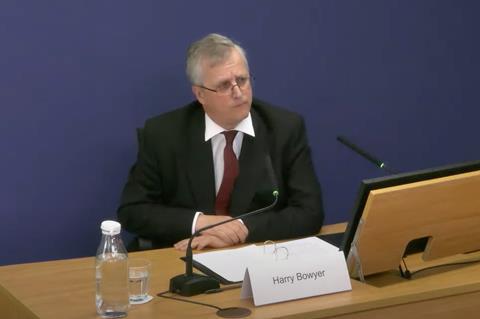
1pm: The inquiry sees again a handwritten note from Post Office lawyer Rodric Williams from a meeting in 2013 which seemed to suggest that discredited expert witness Gareth Jenkins was not advised on his duties. Flemington says nothing was done about this in response.
Proceedings are about to break for lunch to signal the end of Flemington's evidence, but he intervenes to say he wasn't given his chance to make a statement at the outset. Chair Sir Wyn Williams agrees and Flemington says how sorry he is for the pain and suffering caused and that he hopes his evidence has helped. A couple of small laughs in the inquiry room at that last point.
We return at 2pm with barrister Harry Bowyer, formerly with Cartwright King.
12.45: Victims' representative Ed Henry says Post Office lawyers were engaged in 'mutually delegated irresponsibility' and assumed someone else was always dealing with things.
He asks why the Post Office appears to have operated with just one criminal lawyer in Jarnail Singh. Flemington says he was told this had been agreed 'at a high level'. He adds there was also no limit on how much the Post Office could rely on Cartwright King for support.
12.30pm: Victims' lawyers now have their chance to ask questions. Christopher Jacobs takes him straight to an email from Jarnail Singh in 2013.
Singh emailed Flemington asking how to resolve myths and untrue reporting in the media about Second Sight’s remit. He suggests that Post Office might have to start providing extra evidence if defence solicitors start asking for proof of Horizon’s integrity. He warned of the ‘vast scope of disclosure requests’ that may come, adding that it would be expensive to obtain this material ‘because expense simply results from Post Office’s contractual obligations to Fujitsu’. Six months’ data would cost £20,000 and five years’ worth would be a ‘mountain of information’.
Flemington says he would never have accepted disclosure obligations not being met because of cost.
12.15pm: The inquiry sees an email from Flemington to someone in the government explaining the details of the Seema Misra prosecution from 2010. Crucially this email was sent in 2013 - after the Post Office was aware of a report from barrister Simon Clarke that the expert witness evidence in the Misra case was unreliable.
Flemington says his email was based entirely on feedback from Singh. He cannot recall flagging up the evidence issue but says Singh should have made it clear in his Misra explainer.
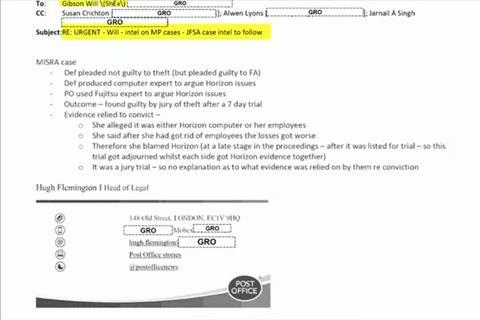
12pm: Stevens getting a little fed up with Flemington failing to recall anything. Starts his questions with the caveat 'I expect I know the answer to this, but do you remember...?'
Flemington doesn't remember.
By 2013 there were serious concerns internally about evidence from expert witness Gareth Jenkins that had formed the basis of some prosecutions. Flemington is asked whether he ever checked if there was an issue with the Post Office not disclosing these concerns.
He responds: 'I assume that was part of what the externals [external lawyers] were looking at.'
We go to another quick break.
11.40am: The inquiry looks at draft PR statements being discussed at the time, discussions about which Flemington was included in.
The statement was that 'when the system has been challenged in criminal courts it has been successfully defended'. This was not true.
Stevens asks whether it was incumbent on Flemington to check that public statements were accurate. He replies: 'I would be relying I suppose on people who have pulled this together.'
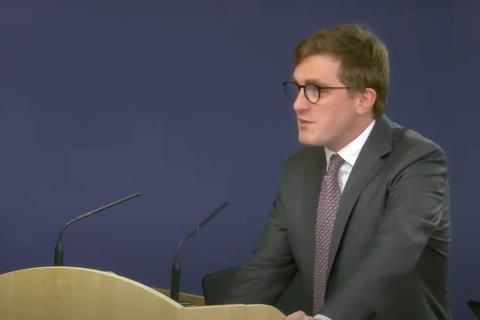
11.30am: Flemington again distances himself from decisions being made about prosecutions by Crichton and Singh. Says that Singh would sometimes wrongly copy him into emails about this, hence why his name keeps cropping up.
11.20am: The inquiry sees advice from Harry Bowyer, a barrister formerly with Cartwright King, advising on the prosecution of Kim Wylie in 2013 at the time of the Second Sight review.
Wylie was accused of stealing £38,000 from Winlaton Post Office where she was sub-postmistress. Bowyer stressed the need to prove the integrity of the Horizon system as there was 'apocryphal evidence on the internet and elsewhere that the system was leading to injustice'.
In opening enquiries into 10 cases to be reviewed by Second Sight, Bowyer said the 'bell cannot be unrung and there will be consequences'.
He went on: 'We have now given ammunition to those attempting to discredit the Horizon system.'
11.10am: Back after a break. We are now on the Second Sight review of Horizon from 2013. Flemington says he cannot recall Crichton advising that the Post Office stop prosecutions at this time, as she said last week. He accepts he was involved in decision-making but cannot recall being involved in discussions around a stay in prosecutions.
10.45am: The inquiry sees emails from 2012 from head of security John Scott to Jarnail Singh, copied into Flemington. Scott said external firm Cartwright King had 'set a benchmark' to ensure decision-making was 'robust, fair and consistent'. Scott says this should be Singh's guide and that the lawyer needs to redraft some advice. In a later email Scott says Singh had been 'defensive of your position, failed to listen and struggled to take on board learning improvements'.
Flemington is asked if there were doubts in the organisation about Singh's competence.
He says Singh had been with the Post Office for 17 years which suggested he knew what he was doing.
10.30am: Flemington is shown emails from Mandy Talbot, a Post Office civil lawyer, copying him into discussions about Horizon. Again he doesn't recall being an important part of these matters. Says his involvement with Horizon was 'sporadic and peripheral' and that responsibility was much more on general counsel Susan Crichton and criminal lawyer Jarnail Singh.
10.15am: Flemington repeatedly appears to distance himself from discussions happening in 2009 and 2010 about Horizon and the reliability of prosecutions. Says he did not read the Computer Weekly article which first brought up issues with Horizon. He recalls hearing 'some noise' at the time and says this would have been taken seriously. Flemington says he did not read the internal Ismay report and believed Horizon was 'robust' based on what colleagues told him.
10am: Flemington is immediately taken to the issue of data deletion in audit files. The inquiry sees internal proposals from 2011 to delete data to comply with data protection laws.
Inquiry counsel Sam Stevens says this shows Post Office was aware of the risk to the integrity of data that was stored. He asks if this was ever communicated to the lawyers.
Flemington says: 'At the highest level it was explained to me that if you did something with this data there might be a risk that it would prejudice the ability to bring [Horizon] cases.'
